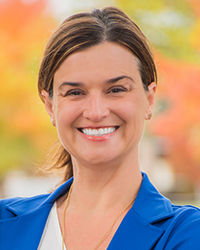Melissa Hoag

Department Chair, Music
Professor of Music Theory
Music Theory Program Coordinator
Contact: [email protected]
Melissa Hoag is the Doris and Paul Travis Professor of Music at Oakland University, where she has been coordinator of the music theory area since Fall 2007. Professor Hoag holds a Ph.D. in music theory with doctoral minors in piano performance and music history from Indiana University. She also holds a bachelor of music degree from Drake University, as well as a certificate in Diversity and Inclusion from Cornell University. In 2024, Professor Hoag was appointed Assistant Director of the School of Music, Theatre and Dance.
In 2023, Professor Hoag was named Chief Reader for the College Board’s Advanced Placement Exam in Music Theory. Each June, Hoag will oversee the scoring activities of roughly 100 AP readers as they score free-response questions taken by around 20,000 high school students. In addition, Hoag will serve on the test development committee for AP Music Theory for the duration of her term as Chief Reader.
Professor Hoag currently serves as co-editor for the Journal of Music Theory Pedagogy, and is member-at-large on the Executive Board for the Society for Music Theory. Professor Hoag previously served as chair of SMT’s Professional Development Committee, and has served on the boards of a number of journals: Music Theory Online, Journal of Music Theory Pedagogy, College Music Symposium, and the Society for Music Theory’s videocast journal, SMT-V. In 2021, Professor Hoag also served as guest editor for a special music theory pedagogy issue of HAYDN.
Listen to Dr. Hoag discuss music theory pedagogy on the podcasts Notes from the Staff and Note Doctors!
Publications
With J. Beavers. Online supplements for Musician’s Guide to Theory and Aural Skills, 5th edition (forthcoming 2026). Norton.
“Serial Radiance in Elisabeth Lutyens’s Seven Preludes for Piano, op. 126, no. 3, (Starlight)” (video). Twelve-Tone and Serial Composition: The First Hundred Years (expected 2025).
“(Night Winds): Turbulence and Tranquility in Elisabeth Lutyens’s Seven Preludes for Piano, op. 126, no. 2” (video). Twelve-Tone and Serial Composition: The First Hundred Years (2025).
“Serialism and Impermanence in Elisabeth Lutyens’s Seven Preludes for Piano, op. 126, no. 1: (‘…whose name was writ in water’)” (video). Twelve-Tone and Serial Composition: The First Hundred Years (2025).
“Potential Energy and Melodic Disjunction in a Brahms Intermezzo.”
MTA: Music Theory and Analysis (2024).
M. Hoag (ed). Expanding the Canon: Black Composers in the Music Theory Classroom (Routledge 2023). Winner, 2024 Society for Music Theory Outstanding Multi-Author Collection Award.
“Counterpoint Expanded.”
SMT-Pod (2023).
“A Trio of Art Songs on Texts by Langston Hughes.”
Expanding the Canon: Black Composers in the Music Theory Classroom, ed. M. Hoag, 119–28. Routledge (2022).
“Putting the Music in ‘Music Fundamentals.’”
Anchor article in The Routledge Companion to Music Theory Pedagogy, ed. Leigh VanHandel, 13–22. Routledge (2020).
“On Relevance and Repertoire in the Eighteenth-Century Counterpoint Classroom.”
BACH: Journal of the Riemenschneider Bach Institute (2018): 388–401.
“Engaging Students in their Own Success: Incorporating Aspects of the First-Year Seminar into First-Year Music Theory and Aural Skills.”
Engaging Students: Essays in Music Pedagogy, vol. 5 (2017).
“Integration, Diversity, and Creativity in Current Music Theory Pedagogy Research.” Response #3, in Chattah, Hoag, Laitz, Sayrs, Snodgrass, “Reflections on the Manifesto.”
College Music Symposium (2016).
Review of Heather Platt and Peter Smith (ed.), Expressive Intersections in Brahms.
Notes: Quarterly Journal of the Music Library Association 70/3 (2014): 468–71.
“Hearing ‘What Might Have Been’: Recomposition as a Pedagogical Tool in Teaching Music Theory.”
Journal of Music Theory Pedagogy 27 (2013): 47–70.
“Seven Strategies for Enabling Success in the First-Year Music Theory Sequence.”
Music Theory Pedagogy Online, vol. 1, no. 1 (2013).
“Brahms’s ‘Great Tragic Opera’: Melodic Drama in ‘Ach, wende diesen Blick’ (Op. 57, no. 4).” Music Theory Online, vol. 17, no. 1 (2011).
“Register and Remembrance in Brahms’s ‘Frühlingslied.’”
Dutch Journal of Music Theory, vol. 16, no. 3 (2011): 167–79.
“Multiply directed moments in a Brahms song: ‘Schön war, das ich dir weihte’ (Op. 95, no. 7).”
Gamut, vol. 4, no. 1 (2011): 93–116.
“Leonard B. Meyer: On the Threshold of Musical Semiotics.”
Semiotica, vol. 142, no. 2 (2002): 447–60.
School of Music, Theatre and Dance
371 Varner Drive
Rochester, MI 48309-4485
(location map)
Academic Office: (248) 370-2030
Fax: (248) 370-2041
[email protected]







